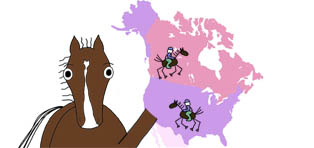Thehorse.com - Full Article
by: Erica Larson, News Editor
May 22 2011, Article # 18275
The outbreak of neurologic equine herpesvirus (EHV-1) continues as new cases were confirmed over the weekend. The source of the outbreak is believed to be the April 29-May 8 National Cutting Horse Association's (NCHA) Western National Championships in Ogden, Utah. Horse owners and veterinarians remain on the lookout for clinical signs associated with EHV-1 in exposed horses.
Equine herpesvirus-1 is highly contagious and can cause a variety of ailments in horses, including rhinopneumonitis (a respiratory disease usually found in young horses), abortion in broodmares, and myeloencephalopathy (the neurologic form). The virus is not transmissible to humans. Clinical signs of EHV-1 myeloencephalopathy (EHM) include fever, ataxia (incoordination), weakness or paralysis of the hind limbs, and incontinence. The virus is generally passed from horse to horse via aerosol transmission (when affected animals sneeze/cough) and contact with nasal secretions.
The USDA released its last situation report Thursday, May 19. At press time today (May 22), the case counts by state were as follows:
Arizona - Both the USDA situation report and the state Department of Agriculture indicate that as of May 18, there has only been one positive case of EHV-1 reported in Arizona. The horse reportedly displayed severe neurologic signs, and the USDA situation report suggested that he was euthanized.
California - A new case of EHV-1 was diagnosed in California yesterday, according to a May 22 (today) statement from the state's Department of Food and Agriculture. This brings the total number of confirmed cases to 17. The statement noted that 16 of the 17 EHV-1 positive horses competed at the NCHA championships in Utah. Only one has been euthanized to date.
Seven of the EHV-1 positive horses displayed neurologic signs, and the other 10 only presented with a fever. Three of the confirmed cases are being treated at the University of California, Davis, Veterinary Teaching Hospital, and all of the positive horses remain under a state-regulated quarantine, the statement read.
Colorado - The total of EHV-1 positive horses in Colorado remains at nine, according to a May 20 statement released by the state's Department of Agriculture. The statement indicated that two horses were euthanized after displaying neurologic clinical signs; however, it was not reported what clinical signs were associated with the rest of the confirmed horses. There are 22 suspected cases, according to the statement.
Idaho - As of yesterday (May 21). the total number of positive cases in Idaho stood at one. The horse was euthanized after displaying severe neurologic signs. Another horse exhibited neurologic signs and was subsequently euthanized; however, no further diagnostic testing was carried out.
New Mexico - According to both the May 19 USDA situation report and a May 19 statement from the state Livestock Board, only one horse has tested positive for EHV-1 in New Mexico. The horse was euthanized after displaying acute neurologic signs.
Oregon - Oregon is still reporting two confirmed cases of neurologic EHV-1 in the state, according to a release from the state's Department of Agriculture.
Texas - According to a May 20 release from the Texas Animal Health Commission, there is still only one confirmed and one suspected case of EHV-1 in the state. It is unclear whether the EHV-1 positive horse displayed neurologic clinical signs or not.
Utah - A May 20 release from the state Department of Agriculture that a horse being treated for EHV-1 was found in its stall in recumbency and was humanely euthanized Saturday. The release noted this was the first fatality related to the outbreak in Utah. Additionally, two more horses were confirmed positive on May 20 (Friday). The number of confirmed cases in Utah is now seven. It is unclear whether the surviving horses displayed neurologic signs associated with the disease.
Washington - The number of confirmed cases of EHV-1 stands at five in Washington, according to a statement from the state's Department of Agriculture. At least two of the cases only displayed a fever. The remaining horses' clinical signs were not reported.
No new information was available from Alberta or British Columbia at press time. There were three confirmed cases in Alberta, according to Chief Provincial Veterinarian, Gerald Hauer, DVM, as of Friday; two of the three had not displayed neurologic signs. There were no confirmed cases in British Columbia as of Friday, according to the province's Ministry of Agriculture.
Montana, Nebraska, Nevada, North Dakota, South Dakota, and Wyoming remain free of confirmed reports.
More information and resources on EHV-1 on Thehorse.com:
http://www.thehorse.com/

No comments:
Post a Comment